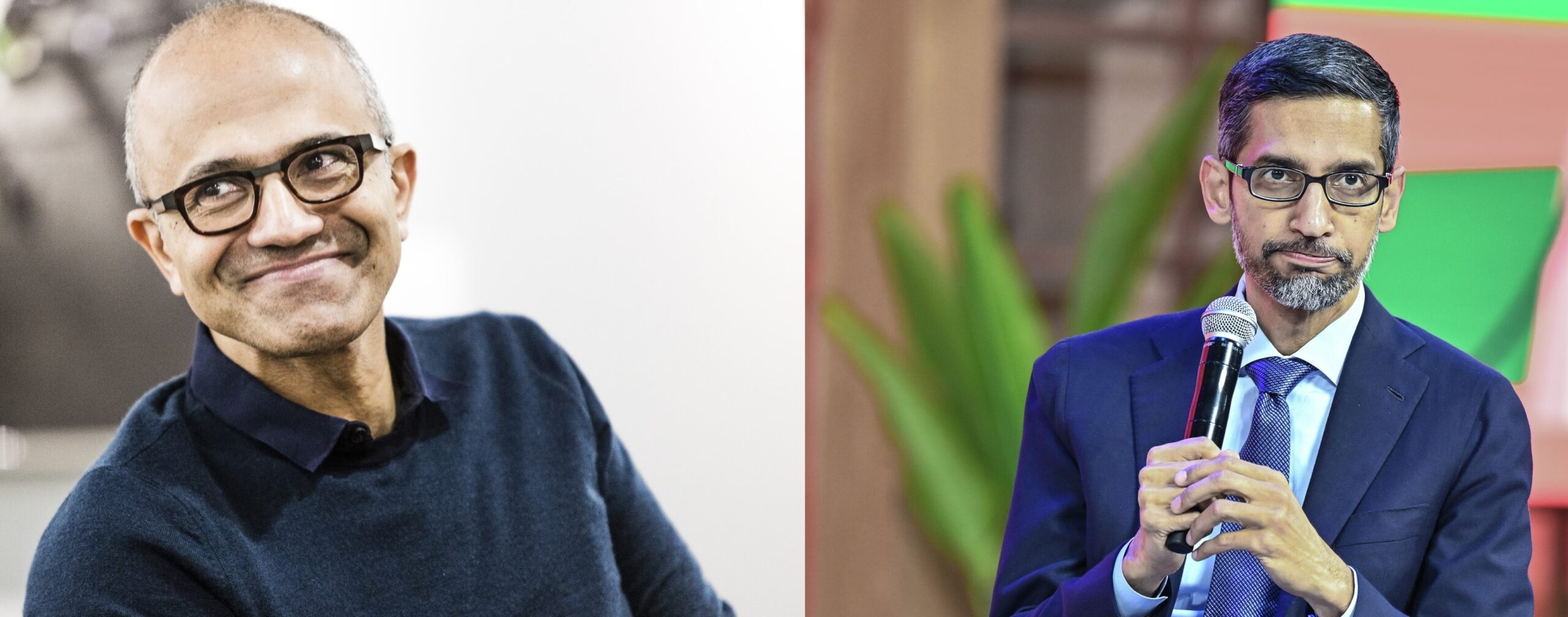Top Stories
Nadella vs Pichai: Who Leads in Net Worth Among Tech Giants?

The competition between two of the tech industry’s most prominent figures, Satya Nadella of Microsoft and Sundar Pichai of Alphabet Inc., has garnered considerable attention as both CEOs approach their financial standing in 2025. As of now, Nadella’s estimated net worth is approximately $1.4 billion, surpassing Pichai’s estimated $1.1 billion. This wealth difference reflects not only their respective corporate successes but also the distinct paths they have taken within the technology sector.
Born in Hyderabad in 1967, Nadella’s journey began with a solid educational foundation. He pursued computer science at the University of Wisconsin in 1988, later earning an MBA from the University of Chicago. Since joining Microsoft in 1992, he has demonstrated exceptional leadership, most notably leading the cloud division, which significantly contributed to the company’s revenue growth. Under his leadership, Microsoft’s market capitalization has soared beyond $3 trillion, marking a staggering increase of over 860% since he became CEO in 2014.
Nadella’s compensation package has also been impressive, exceeding $79 million in 2024, primarily through stock awards tied to Microsoft’s stock performance. While some estimates, such as those from Quiver Quantitative and GuruFocus, suggest his net worth to be around $788 million based on disclosed holdings, the more commonly cited figure remains at approximately $1.4 billion. This discrepancy often arises from differing calculations of unexercised stock options and unreported assets.
In contrast, Sundar Pichai, who was born in Chennai in 1972, has also made significant strides since joining Google in 2004. His rise through the ranks, culminating in his appointment as CEO of Google in 2015 and subsequently CEO of Alphabet Inc. in December 2019, has positioned him at the helm of a technology giant valued at around $2.35 trillion. Pichai is celebrated for launching Google Chrome, which has become the world’s most popular web browser.
As of mid-2025, Pichai’s net worth is estimated at $1.1 billion, with various sources, including Bloomberg and Forbes, confirming this valuation. Earlier estimates had placed his net worth higher, around $1.3 billion, based on his shareholdings and unvested stock options. However, recent evaluations have aligned closer to the $1.1 billion mark.
The financial disparity between Nadella and Pichai, approximately $300 million, underscores their contrasting journeys within Silicon Valley. Both CEOs have emerged from middle-class Indian backgrounds to lead some of the most powerful companies in the world. Their stories illustrate the meritocratic essence of the tech industry, where vision, execution, and innovation are key drivers of success.
As the leaders of two of the most influential tech companies, Nadella and Pichai are not only shaping their fortunes but also influencing the broader trajectory of global technology development. Their strategic decisions in the coming years will likely have lasting impacts on the industry and beyond, highlighting the importance of leadership in navigating the complexities of modern technology.
-

 Entertainment3 months ago
Entertainment3 months agoAnn Ming Reflects on ITV’s ‘I Fought the Law’ Drama
-

 Entertainment4 months ago
Entertainment4 months agoKate Garraway Sells £2 Million Home Amid Financial Struggles
-

 Health3 months ago
Health3 months agoKatie Price Faces New Health Concerns After Cancer Symptoms Resurface
-

 Entertainment3 months ago
Entertainment3 months agoCoronation Street’s Carl Webster Faces Trouble with New Affairs
-

 Entertainment3 months ago
Entertainment3 months agoWhere is Tinder Swindler Simon Leviev? Latest Updates Revealed
-

 Entertainment4 months ago
Entertainment4 months agoMarkiplier Addresses AI Controversy During Livestream Response
-

 World2 weeks ago
World2 weeks agoBailey Announces Heartbreaking Split from Rebecca After Reunion
-

 Science1 month ago
Science1 month agoBrian Cox Addresses Claims of Alien Probe in 3I/ATLAS Discovery
-

 Health4 months ago
Health4 months agoCarol Vorderman Reflects on Health Scare and Family Support
-

 Entertainment4 months ago
Entertainment4 months agoKim Cattrall Posts Cryptic Message After HBO’s Sequel Cancellation
-

 Entertainment2 weeks ago
Entertainment2 weeks agoCoronation Street Fans React as Todd Faces Heartbreaking Choice
-

 Entertainment3 months ago
Entertainment3 months agoOlivia Attwood Opens Up About Fallout with Former Best Friend





















